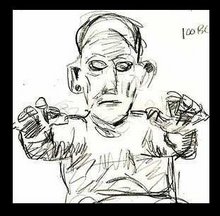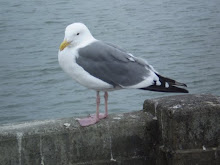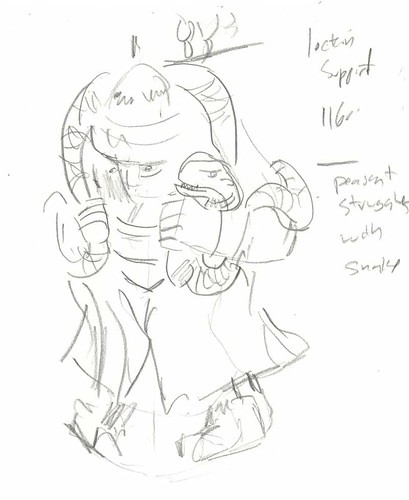A few hours after posting my last post, I happened to follow a link that led to a blog of a friend of a friend. The blogger seems to be a pretty decent guy, probably a great engineer and to my mind is very confident in his worldview. I am guessing here of course, but for the purposes of this follow up post let’s take it as accurate.
Anyway, shortly after I finished whining about it’s hard to understand our (meaning my) place in the world, I read how this guy reflects on a recent birthday. For him asking questions like “What is the sound of one hand clapping” and “How do I know I exist?” are “useless claptrap”. You know, pretty much every blog post I have ever written.
OK, the “how do I know I exist" is a pretty lame, but I suspect he would find all my caterwauling pointless and easily grouped with calculating the number of angels on the head of pin. If I understanding his post, for him knowledge is only “useful” when it has value beyond your own existence (even though he admits he enjoys some of this useless knowledge).
I am only recording it here to remind myself that probably the majority of people in the world, IF they happened to stumble across this well hidden blog, would find me intolerable. So I carry that around with me and wonder if my worldview is actually just a bunch of philosophical BS ( and low grade philosophy at that) ?
But then I can’t stop myself…
[NOTE: the following is NOT meant to criticize this fellow blogger. This is to point out how my mind works, and as a side effect, why I am a horrible dinner guest. I get an idea and start riffing on it, which often leads to some discomfort in the room]
If useful knowledge is only something that has value beyond my meager existence, what about the next person that it helps out? What makes their job or car or house or life any less of a pile of BS? And if my knowledge helps me fill out more TPS reports in triplicate at work, what if the TPS reports are really just another pile?
I may be reading into it, but I think he means to say that useful knowledge is only something that helps you fix some mechanical or structural problem. So that eliminates all fiction and poetry, most movies and TV shows, all of comics and graphic novels.
And the more I think about it, we all will someday return to the earth, be food for worms and end up as worm-waste. It’s a closed circle, the existence beyond my meager existence is just as meager. Isn’t it? None of it is “Useful” if you take the long view.
Jeepers….I am hopeless.
8/20/2016
Camus and Prince Console Me...
“Dearly beloved, we are gathered here today to get through this thing called LIFE.” - Prince
I am between books right now (between deciding what to read, of course), and while trying to remember what I previously wanted to read and scanning book spines on shelves, in closets and cabinets, I pulled out an old copy of The Myth of Sisyphus by Albert Camus. I am pretty sure I read this back in the ‘80’s or ‘90’s, and I think the markings and underlining* are mine, but I would be hard pressed to tell you anything about it other than the title.
To refresh my memory I start reading, and either I internalized some of it while forgetting the origin or Mr. Camus and I have a lot of the same ideas. You know, great minds think alike!
I see in the first essay essentially the same foundation for the way I feel about our world. Or at least one of my rambling points. That point being, “We want the world to make sense, but it DOESN’T!”
Here is Albert’s version…
“I said the world is absurd, but I was too hasty. The world in itself is not reasonable, that is all that can be said. But what is absurd is the confrontation of this irrational and the wild longing for clarity for whose call echoes in the human heart. The absurd depends as much on man as on the world.”
THAT is my point! I don’t know if it inherent in humans or just a byproduct of evolution that demands we find patterns in the world in order to survive. BUT the desire for clarity is obvious. Just look at most political or economic worldviews, the more strident the conviction their way is right, the clearer it is in their minds.
There is more I find harmony with, this bit where he talks about how the only way to “understand” the world is to diminish it.
“Understanding the world for a man is reducing it to the human, stamping it with his seal…Likewise the mind that aims to understand reality can consider itself satisfied only by reducing it to terms of thought”
I think the key thing is not to denigrate “understanding” and certainly not avoid rejoicing in the understanding that comes from science. But rather the bigger questions of “why are we here?”, “what is it all about?”, “who am I really?”. To claim science gives meaning to these anxieties is to strip the humanity out of these question. BUT of course science can be magical and wonderous and “explain” some part of the universe, but they never help us “understand” how we are supposed to get through this thing called life.
-----------------------
*I never underline or highlight now, and it bugs me when I re-read some old book and see I marked it up.
I am between books right now (between deciding what to read, of course), and while trying to remember what I previously wanted to read and scanning book spines on shelves, in closets and cabinets, I pulled out an old copy of The Myth of Sisyphus by Albert Camus. I am pretty sure I read this back in the ‘80’s or ‘90’s, and I think the markings and underlining* are mine, but I would be hard pressed to tell you anything about it other than the title.
To refresh my memory I start reading, and either I internalized some of it while forgetting the origin or Mr. Camus and I have a lot of the same ideas. You know, great minds think alike!
I see in the first essay essentially the same foundation for the way I feel about our world. Or at least one of my rambling points. That point being, “We want the world to make sense, but it DOESN’T!”
Here is Albert’s version…
“I said the world is absurd, but I was too hasty. The world in itself is not reasonable, that is all that can be said. But what is absurd is the confrontation of this irrational and the wild longing for clarity for whose call echoes in the human heart. The absurd depends as much on man as on the world.”
THAT is my point! I don’t know if it inherent in humans or just a byproduct of evolution that demands we find patterns in the world in order to survive. BUT the desire for clarity is obvious. Just look at most political or economic worldviews, the more strident the conviction their way is right, the clearer it is in their minds.
There is more I find harmony with, this bit where he talks about how the only way to “understand” the world is to diminish it.
“Understanding the world for a man is reducing it to the human, stamping it with his seal…Likewise the mind that aims to understand reality can consider itself satisfied only by reducing it to terms of thought”
I think the key thing is not to denigrate “understanding” and certainly not avoid rejoicing in the understanding that comes from science. But rather the bigger questions of “why are we here?”, “what is it all about?”, “who am I really?”. To claim science gives meaning to these anxieties is to strip the humanity out of these question. BUT of course science can be magical and wonderous and “explain” some part of the universe, but they never help us “understand” how we are supposed to get through this thing called life.
-----------------------
*I never underline or highlight now, and it bugs me when I re-read some old book and see I marked it up.
8/09/2016
Why Being "Right" is Never Wrong
Interesting take on religion and politics and how for religious conservatives some people are always on the the wrong side of "right" and others stay "in" no matter what the SIN!
------------------------------------------------
When your Christian doctrine is built entirely around heaven and hell as a mechanistic punishment/reward system for sin, you will end up bifurcating humanity into two categories: those who can never do anything right and those who can never mess up badly enough to be disqualified.
If sin has to be wicked enough to deserve eternal torture, that means that non-Christians (or Democrats) are nihilistically evil. Nothing about their views or actions can possibly be right, which is why they must not be negotiated or compromised with under any circumstances. There is no reason to try to understand where they’re coming from. They are simply wrong. They must be utterly opposed and utterly delegitimized (for their own good, of course). That’s why doing anything that might contribute to Hillary Clinton’s presidency is unimaginable to Grudem:
If this election is close (which seems likely), then if someone votes for a write-in candidate instead of voting for Trump, this action will directly help Hillary Clinton, because she will need one less vote to win. Therefore the question that Christians should ask is this: Can I in good conscience act in a way that helps a liberal like Hillary Clinton win the presidency?On the other hand, no sin is great enough to disqualify a born-again Christian from heaven (or a Republican politician from being elected). Leaders who are inside the Jesus fold must be given the benefit of the doubt and complete grace. As long as their sin is acknowledged, it can be instantaneously put on Jesus’ cross and forgiven. That’s why all that Grudem has to do is acknowledge Trump’s imperfections before endorsing him.
He is egotistical, bombastic, and brash. He often lacks nuance in his statements. Sometimes he blurts out mistaken ideas (such as bombing the families of terrorists) that he later must abandon. He insults people. He can be vindictive when people attack him. He has been slow to disown and rebuke the wrongful words and actions of some angry fringe supporters. He has been married three times and claims to have been unfaithful in his marriages. These are certainly flaws, but I don’t think they are disqualifying flaws in this election.
From Patheos
8/01/2016
Trump Like Behaviour
FOLLOWING I follow politics closely. The rise of Trump has been great to watch. The blustering, insulting, anatomical comparisons — remarkably chimplike.
http://www.nytimes.com/2016/07/31/opinion/sunday/frans-de-waal.html?ref=opinion&_r=0
Frans de Waal is a Dutch-American primatologist who studies the parallels between human and ape social behavior, particularly relating to empathy, outrage, peacemaking, conflict and cooperation. His latest book is “Are We Smart Enough to Know How Smart Animals Are?”
http://www.nytimes.com/2016/07/31/opinion/sunday/frans-de-waal.html?ref=opinion&_r=0
Frans de Waal is a Dutch-American primatologist who studies the parallels between human and ape social behavior, particularly relating to empathy, outrage, peacemaking, conflict and cooperation. His latest book is “Are We Smart Enough to Know How Smart Animals Are?”
Subscribe to:
Posts (Atom)




